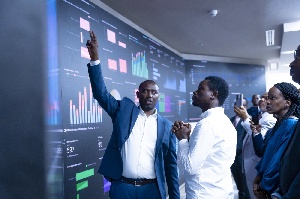Africa News of Thursday, 24 April 2025
Source: www.ghanawebbers.com
Rwanda: How Rwanda's New Health Intelligence Centre Could Transform Healthcare
The Ministry of Health has launched the Health Intelligence Centre. This centre uses mathematical models to predict disease trends months in advance.
It employs coders, data scientists, mathematicians, and public health experts. Their goal is to improve health system monitoring and respond to health threats effectively.
With data-driven predictions, interventions like indoor residual spraying can be more targeted. Health workers may focus on specific high-risk areas identified by these models.
Muhammad Semakula leads the Department for Planning, Monitoring, Evaluation and Health Financing. He emphasizes the need for a mathematical understanding of diseases to intercept them early.
This system helps slow or stop disease spread by identifying risks quickly. It considers factors like transmission through contact or airborne particles in crowded spaces.
Scientists at the centre can also forecast potential health situations that haven't emerged yet. They use mathematical and technological simulations for this purpose.
"You don't have to wait for a disease to enter the country," Semakula explained. By developing models based on natural patterns, they can predict threats and prepare interventions ahead of time.
The scientists can forecast up to three months in advance. They alert Ministry of Health teams about expected infection cases in specific areas. This allows for timely preventive measures before threats escalate.
"This information is very useful for targeted intervention," he noted. Knowing where problems arise helps tackle them effectively and avoid economic lockdowns.
The centre will monitor some health services in real-time. It consolidates data from various facilities and communities for analysis and policy-making.
Its work includes tracking public equipment usage, such as ambulances and hospital fridges. The centre collects data on medical procedure outcomes to inform decision-making.
It has several departments, including a data warehouse that stores patient care information and routine reports from health facilities. Community feedback, including social media discussions about health issues, is also monitored.
One key function is analyzing health outcomes to identify causes behind trends and find solutions. This information feeds into machine learning models that predict future outcomes based on past cases.
These models use artificial intelligence to warn medics about potential risks. For example, they can alert doctors if a woman visiting a facility is at high risk for pregnancy complications.
The use of technology supports Rwanda's efforts to address shortages of doctors and specialists effectively.











